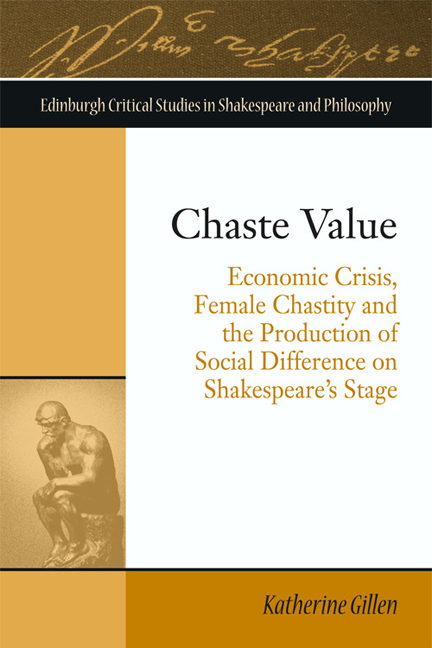 Chaste Value
Chaste Value Published online by Cambridge University Press: 22 December 2017
The plays discussed in Chaste Value respond to a sense that early capitalist forces destabilise the primacy of intrinsic personal value, which was fundamental to the aristocratic order. Tragedies such as The Revenger's Tragedy, The White Devil and The Changeling underscore capitalism's disruptive power, suggesting that shifting social hierarchies and commercial modes of evaluation engender both sin and personal fragmentation. A fully performative self emerges from this context, yet proves incapable of ethical action. Plays such as Othello draw out the racial implications of this commoditised performativity. Iago's proclamation ‘I am not what I am’ (I, i, 64) signals the alienation and emptiness of the commoditised self; when he displaces these characteristics onto Othello, he paints black bodies as susceptible to a particularly abject form of commoditisation that involves objectification rather than performativity. City comedies, by contrast, work to accommodate new capitalist realities, acknowledging overlapping sexual and commercial economies and drawing on female chastity to articulate new modes of selfhood. Rather than embracing this constructed selfhood, tragicomic romances such as The Merchant of Venice, The Renegado and Cymbeline recuperate intrinsic personal value from market-based logics, in part as a means of restricting the exchange of women in multicultural environments. Such intrinsic value, however, is largely reserved for middle- and upper-class white Christians and is not extended to workers, the poor, racial and religious others, or those marked by nonnormative sexual identities.
In their use of chastity to explore questions of value, subjectivity and commoditisation, early modern plays register many of modernity's foundational social and epistemological trends. They contribute to the development of homo economicus, the economic subject who must balance an interior reality against a host of external markers, including wealth, status and appearance. The viable economic subject, a play such as Bartholomew Fair indicates, must learn to live with his or her commodity potential and conform to the transactional nature of urban, capitalist life. The drama's exploration of economic selfhood also informs the rise of possessive individualism. Plays ranging from Troilus and Cressida to The Fair Maid of the West, Part I suggest that some people are capable of managing or possessing themselves, while some are depicted as possessions or must accept that their labour power, sexuality and other attributes effectively belong to others.
To save this book to your Kindle, first ensure [email protected] is added to your Approved Personal Document E-mail List under your Personal Document Settings on the Manage Your Content and Devices page of your Amazon account. Then enter the ‘name’ part of your Kindle email address below. Find out more about saving to your Kindle.
Note you can select to save to either the @free.kindle.com or @kindle.com variations. ‘@free.kindle.com’ emails are free but can only be saved to your device when it is connected to wi-fi. ‘@kindle.com’ emails can be delivered even when you are not connected to wi-fi, but note that service fees apply.
Find out more about the Kindle Personal Document Service.
To save content items to your account, please confirm that you agree to abide by our usage policies. If this is the first time you use this feature, you will be asked to authorise Cambridge Core to connect with your account. Find out more about saving content to Dropbox.
To save content items to your account, please confirm that you agree to abide by our usage policies. If this is the first time you use this feature, you will be asked to authorise Cambridge Core to connect with your account. Find out more about saving content to Google Drive.